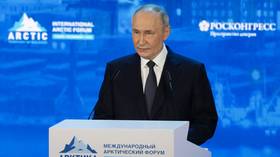EU ‘disinfo-busting’ outlet targets ‘Russophiles’ in McCarthyist campaign to push own narrative

In a stunt that would have made Joe McCarthy proud, a Brussels-based think tank endeavoured to brand Twitter users posting about a scandal involving French President Emmanuel Macron’s former bodyguard as ‘Russophiles’
EU DisinfoLab, whose raison d’etre is to “fight disinformation with innovative methodology,” published a report about “hyperactive” Twitter accounts that were sharing news about Alexandre Benalla, Macron’s former deputy chief of staff and bodyguard who was fired in July when it was revealed that he had violently assaulted a protester during an annual May Day rally.
French media excitedly latched onto the DisinfoLab report (The Russians! The Russians!) and soon headlines appeared about Russian “bots” and their apparent involvement in the Benalla scandal, prompting national discussions about what could be done to combat social media manipulation by the “Russophile” accounts. During all the hysteria, the EU DisinfoLab graciously decided to clarify its findings to say that not all of the accounts posting about Benalla were of the ‘Russophile’ variety. But, according to the NGO’s co-founder Nicolas Vanderbiest, the case was a hot topic for the “Russophile ecosystem” and a sizable 27 percent of the accounts were part of the “Russian disinformation system”.
If you were wondering, the “Russian disinformation system” is, according to DisinfoLab, comprised of anyone sharing content from RT or Sputnik or anyone promoting the “Russian narrative” in any way.
Because remember, in good, free, open Democratic societies, questioning established narratives is unacceptable and grounds for public shaming and having your name immediately placed on some kind of Twitter blacklist. You might also be as surprised as I was to hear there is apparently an overarching “Russian narrative” for every world event, regardless of whether or not it relates to Moscow in any way.
Making matters worse, the NGO released the raw data which it used in its research which appeared to categorize users with labels such as “jew,”“lesbian” and “homo” – prompting questions from users about why they were being politically profiled in such a public way. The NGO then seemingly deleted the those files and denied posting them before appearing to admit to publishing them and releasing an apology to those affected.
Ironically, funding for the report on this alleged suspicious Russian Twitter activity was provided by none other than Twitter itself. Luckily, Twitter had some money lying around for such purposes; the very money it had received from RT and Sputnik to run ads on its platform. Having realized the error of its ways, Twitter pledged that money to “civil society” projects such as EU DisinfoLab – who was the happy recipient of $125,000, according to the organization itself.
Immediately, the furor surrounding the ‘Russophiles’ list reminded me of a similar attempt by a European ‘think tank’ to brand anyone remotely associated with RT as Kremlin stooges. In October of last year, the US-government funded, Prague-based ‘European Values’ outfit published a list of 2,327 people who have appeared as guests on RT, branding them “useful idiots” for the the Kremlin.
Sampling of the "useful idiots" in the celebrity section of @EvropskeHodnoty's ridiculous report. Kremlin has its claws in deep. pic.twitter.com/6A1LXGUu4n
— Danielle Ryan (@DanielleRyanJ) October 21, 2017
Included on that list were well-known Russian agents Greta van Susteren, Gloria Steinem, Bob Woodward, Dick Cheney, Naomi Klein, Kofi Annan, Perez Hilton, Denzel Washington and Pierce Brosnan.
The think tanks that produce utterly pointless reports like this claim that it is all in an effort to fight disinformation and cleanse the news environment of false or misleading information. In reality, these reports are nothing more than exercises in public shaming and serve no legitimate, useful purpose whatsoever. They are not designed to protect or promote truth per se, but to bolster their preferred narrative and ensure that no-one is exposed to any other dangerous ideas or perspectives — and that if they are, they quickly discount them in favor of the safer, sanctioned narratives.
They are part of a long history in the West – but particularly in the US – of linking political opponents or dissidents to Russia in an attempt to discredit them. They are the modern-day incarnation (if far less effective) of the McCarthyist pamphlets of the 1950s, denigrating public figures (or these days just random Twitter users) for the alleged crime of being sympathetic to the Soviet Union/Russia.
The infamous Red Channels pamphlet which listed 150 actors, writers, journalists, musicians and other entertainers who were purportedly communist sympathisers ended careers and threatened to ruin lives. No doubt, the likes of EU DisinfoLab and European Values would love to be so influential, but luckily, in today’s media landscape, it’s much easier to call them out for the chancers that they are.
Red Channels: A 1950's zine that ratted out supposed Commies in entertainment. 150 names were named inc. Lena Horne. pic.twitter.com/FYtYe2rh6N
— YouMust RememberThis (@RememberThisPod) May 19, 2016
Considering that, as EU DisinfoLab admitted, only 27 percent of those posting about the Benalla affair are ‘Russophiles’ (and the rest were presumably not) and that there was no evidence of any Russian government “interference” in the case, it would seem more likely that a wide variety of French citizens, from all points on the political spectrum, were not wholly delighted with the fact that their president’s bodyguard pretended to be a police officer and beat people up at a protest— and decided to tweet their frustrations, as is their prerogative.
But it would be a bit more difficult to produce a “disinformation” report about that.
The statements, views and opinions expressed in this column are solely those of the author and do not necessarily represent those of RT.

















